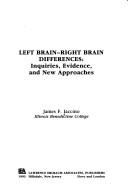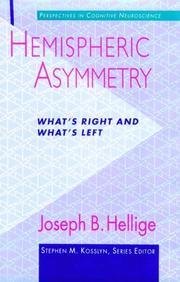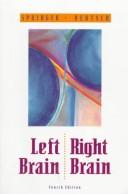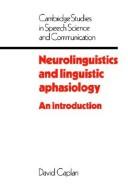| Listing 1 - 9 of 9 |
Sort by
|

ISBN: 0805813403 Year: 1993 Publisher: Hillsdale Erlbaum
Abstract | Keywords | Export | Availability | Bookmark
 Loading...
Loading...Choose an application
- Reference Manager
- EndNote
- RefWorks (Direct export to RefWorks)

ISBN: 0674387309 9780674387300 0674005597 9780674005594 Year: 1993 Publisher: Cambridge (Mass.): Harvard university press
Abstract | Keywords | Export | Availability | Bookmark
 Loading...
Loading...Choose an application
- Reference Manager
- EndNote
- RefWorks (Direct export to RefWorks)
Brain --- Cerebral dominance --- Cerebral hemispheres --- Dominance cérébrale --- Cerveau --- Physiology --- Hémisphères --- Dominance, Cerebral --- physiology --- 612.8 --- Functional asymmetry (Brain) --- Hemispheric dominance (Brain) --- Lateralization (Brain) --- Left and right brain --- Right and left brain --- Dual-brain psychology --- Laterality --- Whole brain learning --- Zenuwstelsel. Zintuigen. Motorische neurowetenschappen --- Cerebral dominance. --- Dominance, Cerebral. --- Medische psychologie --- Physiology. --- neuropsychologie --- neuropsychologie. --- Dominance cérébrale --- Hémisphères --- physiology. --- Dominance cérébrale. --- Hémisphère cérébral. --- dominance cérébrale --- Physiologie. --- Latéralité --- * neuropsychologie. --- Latéralité.
Book
ISBN: 2091205230 9782091205236 Year: 1993 Publisher: Paris Nathan
Abstract | Keywords | Export | Availability | Bookmark
 Loading...
Loading...Choose an application
- Reference Manager
- EndNote
- RefWorks (Direct export to RefWorks)
Cerveau - Dualite --- Dominance cérébrale --- Cerveau - Localisation cérébrale --- Cerveau - Hemispheres --- Lateralite --- Apprentissage, Psychologie de l' --- Cerveau

ISBN: 0813019133 9780813019130 0813011957 Year: 1993 Publisher: Gainesville : University Press of Florida,
Abstract | Keywords | Export | Availability | Bookmark
 Loading...
Loading...Choose an application
- Reference Manager
- EndNote
- RefWorks (Direct export to RefWorks)
Employing thc theoretical resources provided by cultural critics such as Adorno, Jameson, Althusser, and Foucault, M. Keith Booker examines the treatment of issues of power and domination in modern literature. Discussing texts such as Virginia Woolf's The Waves, Vladimir Nabokov's Lolita, Thomas Pynchon's V., and Italo Calvino's If on a winter's night a traveler, Booker focuses on gender relations as a locus of struggles for power in human relations generally. He also pays special attention to the work of Samuel Beckett, reading the novels Watt and The Lost Ones to explore the issues of power and domination in an Irish cultural context. For all of the texts read, such issues are explored in terms not only of content but of style and form. What is distinctive about many modern texts, Booker claims, is the reflexive way literary meditations on power, authority, and domination turn inward to involve examinations of textuality and reading as images of the kinds of struggles for mastery that inform society at large. Booker suggests that literary knowledge is of a different order than the traditional theoretical knowledge that is equated with power in the West. "Literature has the potential to explore and illuminate objects of inquiry in a mode of dialogue and performance rather than by seeking to dominate them in the traditional mode of science," he writes. "Especially in the difficult and complex texts of modern literature, successful reading requires that readers and texts work together, pointing toward ways the human drive for mastery can be fulfilled through cooperation rather than through demanding the submission of some Other who is being mastered or dominated."
Fiction --- Dominance (Psychology) in literature. --- Sex role in literature. --- Power (Social sciences) in literature. --- Dominance (Psychology) in literature --- Sex role in literature --- Power (Social sciences) in literature --- Literature - General --- Languages & Literatures --- History and criticism. --- History and criticism
Book
Abstract | Keywords | Export | Availability | Bookmark
 Loading...
Loading...Choose an application
- Reference Manager
- EndNote
- RefWorks (Direct export to RefWorks)
Handwriting --- Neuropsychology --- Neurophysiology --- Brain --- Hand --- physiology --- Writing --- Neurolinguistics. --- Aphasia. --- Agraphia. --- Cerebral dominance. --- Handwriting. --- Physiological aspects. --- Localization of functions. --- physiology.

ISBN: 0716723735 Year: 1993 Publisher: New York Freeman
Abstract | Keywords | Export | Availability | Bookmark
 Loading...
Loading...Choose an application
- Reference Manager
- EndNote
- RefWorks (Direct export to RefWorks)
Brain --- Cerebral dominance --- Left and right (Psychology) --- Dominance, Cerebral --- Functional Laterality --- 612.8 --- Laterality --- Psychology --- Functional asymmetry (Brain) --- Hemispheric dominance (Brain) --- Lateralization (Brain) --- Left and right brain --- Right and left brain --- Cerebral hemispheres --- Dual-brain psychology --- Whole brain learning --- Brain function localization --- Cerebral localization --- Localization of cerebral functions --- Neurophysiology --- Phrenology --- Ambidexterity --- Behavioral Laterality --- Handedness --- Laterality of Motor Control --- Mirror Writing --- Laterality, Behavioral --- Laterality, Functional --- Mirror Writings --- Motor Control Laterality --- Writing, Mirror --- Writings, Mirror --- Split-Brain Procedure --- Hemispheric Specialization --- Cerebral Dominance --- Dominances, Cerebral --- Specialization, Hemispheric --- Localization of functions --- physiology --- Zenuwstelsel. Zintuigen. Motorische neurowetenschappen --- Functional localization --- Physiology of nerves and sense organs

ISBN: 0440217806 Year: 1993 Publisher: New York, NY Island Books
Abstract | Keywords | Export | Availability | Bookmark
 Loading...
Loading...Choose an application
- Reference Manager
- EndNote
- RefWorks (Direct export to RefWorks)
Mormonism --- gender-issues --- Feminism --- sexism --- marriage --- secret ceremonies --- Deborah Laake --- the Mormon Church --- Mormon teachings --- rituals --- divine revelation --- male dominance --- Church of Latter-day Saints --- excommunication

ISBN: 0521311950 0521324203 0511620675 9780521311953 9780511620676 9780521324205 Year: 1993 Publisher: Cambridge Cambridge University Press
Abstract | Keywords | Export | Availability | Bookmark
 Loading...
Loading...Choose an application
- Reference Manager
- EndNote
- RefWorks (Direct export to RefWorks)
This textbook provides a comprehensive introduction to the emerging fields of neurolinguistics and linguistic aphasiology. Reflecting the dramatic changes that have taken place in the study of language disorders over the last decade, David Caplan's approach is firmly interdisciplinary. He introduces concepts from the main contributing disciplines - neurology, linguistics, psychology and speech pathology - in such a way that they will be clearly understood by all students, whatever their particular background. The topics covered have been carefully selected to demonstrate how the more sophisticated topical neurolinguistic approaches have developed from traditional clinical models. The critical and detailed discussion of all the main theoretical issues in the fields makes this a fundamental work not only for students but also for specialists.
Psycholinguistics --- Psychiatry --- Aphasie --- Neuro-linguistics --- Neurolinguistique --- Neurolinguïstiek --- Aphasia. --- Alogia --- Anepia --- Aphasia, Ageusic --- Aphasia, Auditory Discriminatory --- Aphasia, Commisural --- Aphasia, Functional --- Aphasia, Global --- Aphasia, Graphomotor --- Aphasia, Intellectual --- Aphasia, Mixed --- Aphasia, Post-Ictal --- Aphasia, Post-Traumatic --- Aphasia, Progressive --- Aphasia, Semantic --- Aphasia, Syntactical --- Dejerine-Lichtheim Phenomenon --- Dysphasia, Global --- Lichtheim's Sign --- Logagnosia --- Logamnesia --- Logasthenia --- Aphasia, Acquired --- Acquired Aphasia --- Ageusic Aphasia --- Ageusic Aphasias --- Alogias --- Anepias --- Aphasia, Post Ictal --- Aphasia, Post Traumatic --- Aphasias, Ageusic --- Aphasias, Auditory Discriminatory --- Aphasias, Commisural --- Aphasias, Functional --- Aphasias, Global --- Aphasias, Graphomotor --- Aphasias, Intellectual --- Aphasias, Mixed --- Aphasias, Post-Ictal --- Aphasias, Post-Traumatic --- Aphasias, Progressive --- Aphasias, Semantic --- Aphasias, Syntactical --- Auditory Discriminatory Aphasia --- Auditory Discriminatory Aphasias --- Commisural Aphasia --- Commisural Aphasias --- Dejerine Lichtheim Phenomenon --- Discriminatory Aphasia, Auditory --- Discriminatory Aphasias, Auditory --- Dysphasias, Global --- Functional Aphasia --- Functional Aphasias --- Global Aphasia --- Global Aphasias --- Global Dysphasia --- Global Dysphasias --- Graphomotor Aphasia --- Graphomotor Aphasias --- Intellectual Aphasia --- Intellectual Aphasias --- Lichtheim Sign --- Lichtheims Sign --- Logagnosias --- Logamnesias --- Logasthenias --- Mixed Aphasia --- Mixed Aphasias --- Phenomenon, Dejerine-Lichtheim --- Post-Ictal Aphasia --- Post-Ictal Aphasias --- Post-Traumatic Aphasia --- Post-Traumatic Aphasias --- Progressive Aphasia --- Progressive Aphasias --- Semantic Aphasia --- Semantic Aphasias --- Sign, Lichtheim's --- Syntactical Aphasia --- Syntactical Aphasias --- Dominance, Cerebral --- Landau-Kleffner Syndrome --- Aphasia --- Linguistics. --- Neurophysiology --- Neurolinguistics --- #KVHB:Afasie --- #KVHB:Neurolinguistiek --- Dysphasia --- Biolinguistics --- Higher nervous activity --- Neuropsychology --- Brain --- Language disorders --- Speech disorders --- Linguistic --- Diseases --- Neurophysiology. --- Neurolinguistics. --- Word Deafness --- Deafness, Word --- Linguistics --- Arts and Humanities --- Language & Linguistics

ISBN: 0582022215 9780582022218 Year: 1993 Volume: vol *3 Publisher: London Longman
Abstract | Keywords | Export | Availability | Bookmark
 Loading...
Loading...Choose an application
- Reference Manager
- EndNote
- RefWorks (Direct export to RefWorks)
Psycholinguistics --- Neuropathology --- Pragmatics --- Afasie --- Aphasia --- Aphasie --- Langage [Psychologie du ] --- Langage et langues--Aspect psychologique --- Langage et langues--Psychologie --- Langage et psychanalyse --- Langage--Aspects psychologiques --- Langage--Psychologie --- Language and psychoanalysis --- Language--Psychological aspects --- Language--Psychology --- Langues--Psychologie --- Parole--Psychologie --- Psychanalyse et langage --- Psychoanalyse en taal --- Psychoanalysis and language --- Psycholinguistique --- Psychologie du langage --- Psychologie van de taal --- Taal en psychoanalyse --- Taal--Psychologie --- Taal--Psychologische aspecten --- Taalpsychologie --- PSYCHOLINGUISTICS --- APHASIA --- --Aphasie --- --Thérapie --- --Aphasia. --- Psycholinguistics. --- Language, Psychology of --- Language and languages --- Psychology of language --- Speech --- Linguistics --- Psychology --- Thought and thinking --- Psycholinguistic --- Alogia --- Anepia --- Aphasia, Ageusic --- Aphasia, Auditory Discriminatory --- Aphasia, Commisural --- Aphasia, Functional --- Aphasia, Global --- Aphasia, Graphomotor --- Aphasia, Intellectual --- Aphasia, Mixed --- Aphasia, Post-Ictal --- Aphasia, Post-Traumatic --- Aphasia, Progressive --- Aphasia, Semantic --- Aphasia, Syntactical --- Dejerine-Lichtheim Phenomenon --- Dysphasia, Global --- Lichtheim's Sign --- Logagnosia --- Logamnesia --- Logasthenia --- Aphasia, Acquired --- Dysphasia --- Acquired Aphasia --- Ageusic Aphasia --- Ageusic Aphasias --- Alogias --- Anepias --- Aphasia, Post Ictal --- Aphasia, Post Traumatic --- Aphasias, Ageusic --- Aphasias, Auditory Discriminatory --- Aphasias, Commisural --- Aphasias, Functional --- Aphasias, Global --- Aphasias, Graphomotor --- Aphasias, Intellectual --- Aphasias, Mixed --- Aphasias, Post-Ictal --- Aphasias, Post-Traumatic --- Aphasias, Progressive --- Aphasias, Semantic --- Aphasias, Syntactical --- Auditory Discriminatory Aphasia --- Auditory Discriminatory Aphasias --- Commisural Aphasia --- Commisural Aphasias --- Dejerine Lichtheim Phenomenon --- Discriminatory Aphasia, Auditory --- Discriminatory Aphasias, Auditory --- Dysphasias, Global --- Functional Aphasia --- Functional Aphasias --- Global Aphasia --- Global Aphasias --- Global Dysphasia --- Global Dysphasias --- Graphomotor Aphasia --- Graphomotor Aphasias --- Intellectual Aphasia --- Intellectual Aphasias --- Lichtheim Sign --- Lichtheims Sign --- Logagnosias --- Logamnesias --- Logasthenias --- Mixed Aphasia --- Mixed Aphasias --- Phenomenon, Dejerine-Lichtheim --- Post-Ictal Aphasia --- Post-Ictal Aphasias --- Post-Traumatic Aphasia --- Post-Traumatic Aphasias --- Progressive Aphasia --- Progressive Aphasias --- Semantic Aphasia --- Semantic Aphasias --- Sign, Lichtheim's --- Syntactical Aphasia --- Syntactical Aphasias --- Dominance, Cerebral --- Landau-Kleffner Syndrome --- Psychological aspects --- Aphasia. --- Orthopedagogiek --- taal- en spraakstoornissen --- taal- en spraakstoornissen. --- Taal- en spraakstoornissen. --- Brain --- Language disorders --- Speech disorders --- Diseases --- Word Deafness --- Deafness, Word --- --Aphasia --- Thérapie
| Listing 1 - 9 of 9 |
Sort by
|

 Search
Search Feedback
Feedback About UniCat
About UniCat  Help
Help News
News